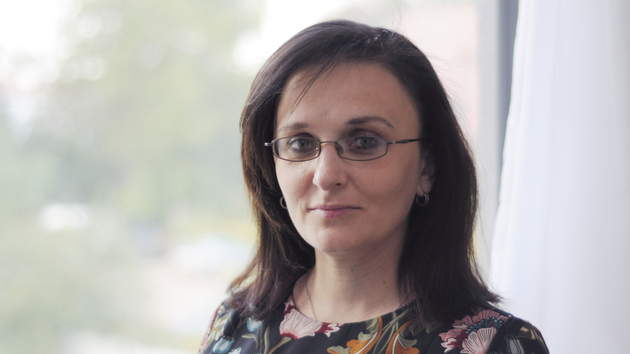To halt expression of ABC proteins
Multidrug resistance means that cancer cells get less sensitive and/or completely resistant to the effect of drugs. Each subsequent round of chemotherapy increases the likelihood of multidrug resistance. The main problem is that resistance is a broad-spectrum phenomenon, that is, it is not about the resistance only to the drug the patient has been treated with so far, but also to a whole range of other drugs. – We are trying to deprive cancer cells of one of the defence mechanisms that are responsible for the formation of the multidrug resistance phenomenon – explains dr hab. Agnieszka Robaszkiewicz, UL Professor. – In the scientific literature numerous defence mechanisms in relation to cytostatics have been described. One of these is the presence of proteins called ABC transporters in the membrane of the cancer cell. These proteins remove from the cell the drug which it is attacked with. One mechanism for cancer cells to acquire resistance is to increase the amount of ABC proteins in their membrane. The more the ABC proteins, the more drug is removed from the cell and the weaker its effectiveness.
ABC protein expression consists of several stages. Lodz scientists target the first stage – already at the genome level.
We are trying to inhibit the transcript formation. If we are successful, there will be no protein that would later end up in the membrane of the cancer cell. We administer compounds that inhibit the formation of proteins at the first stage and then after several tens of hours we observe a decrease in the number of proteins in cell membranes, which makes the cancer cell more vulnerable
– dr hab. Agnieszka Robaszkiewicz, UL Professor, Faculty of Biology and Environmental Protection
However, it must be remembered that this is only one of the defence mechanisms of the cell. Thus, the tested compounds can be used in these types of neoplasms, where overexpression of ABC proteins is the main mechanism of resistance. – We have managed to find two compounds that inhibit the formation of these proteins and increase the flow of drugs inside the cell in cells resistant to various types of chemotherapeutic agents – says dr hab. Robaszkiewicz. – This increases the toxicity of drugs, which can translate into increasing the effectiveness of chemotherapy in patients.
Side Effects – to be examined
At the moment, the effect of the substance has been confirmed on models of triple negative breast cancer, for the treatment of which chemotherapy is mainly used, and non-small cell lung cancer, the advanced forms of which are also treated with chemotherapeutic agents. The examined method may also prove effective in case of other types of cancer, but further research is needed.
The research has already taken two years and will last one more year.
We have produced two compounds that work on a cellular model. Now we are starting the stage of research on an animal model. First of all, we need to examine whether these compounds are not dangerous for the patients, how they affect the heart, liver or kidneys and how they are removed from the body. For now, there is no indication that they can negatively affect the work of the main organs. Based on what we already know, we do not expect these substances to cause additional side effects, but it needs to be carefully checked
– informs dr hab. Robaszkiewicz.
The research is carried out on the basis of a grant within the 10th Leader programme of the National Centre for Research and Development. The team received PLN 1 million 355 thousand for the implementation of the study “Przełamywanie oporności wielolekowej nowotworów na poziomie genomu” [Breaking the multidrug resistance of cancers at the genome level].
Source: Faculty of Biology and Environmental Protection, University of Lodz
Edit: Justyna Kowalewska (3PR Consulting)

